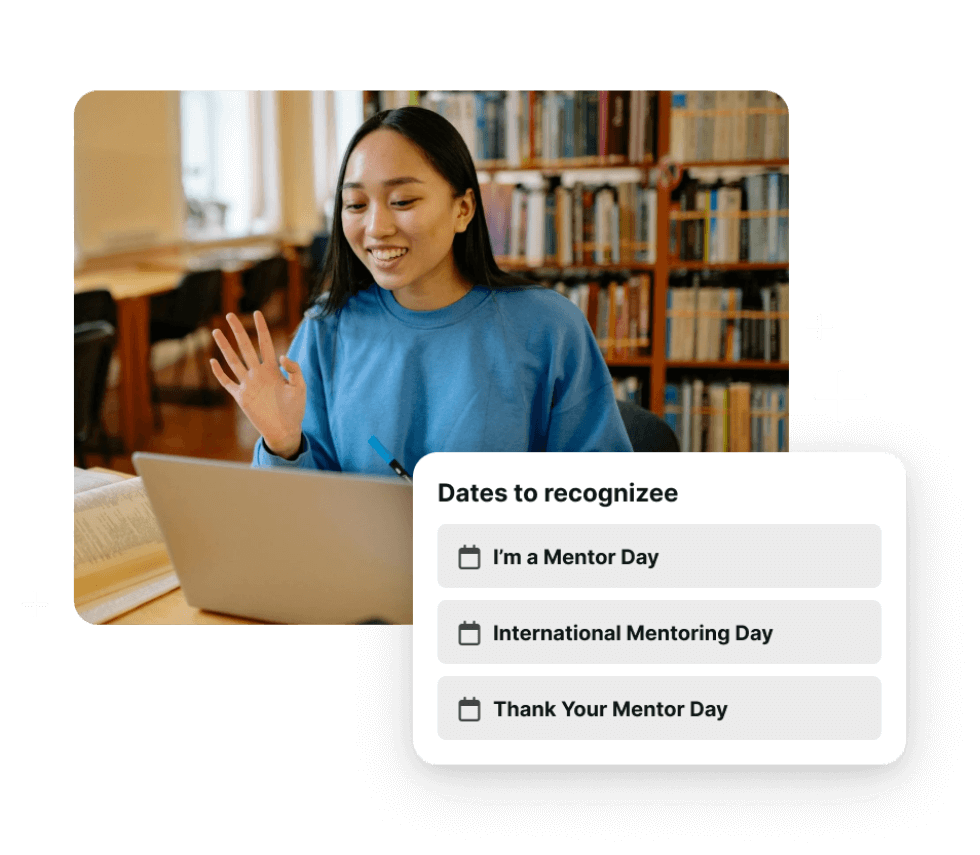How to Promote Your Mentoring Program
Just creating a mentoring program isn’t enough to make it succeed. You also need a diligent plan to promote and market your program.
We are excited to introduce Chronus’ new CEO Ankur Ahlowalia! Read News Release
Ready to take mentoring to the next level? With the right tools and a little inspiration, you can build connections that spark big growth.

National Mentoring Month is a campaign dedicated to recognizing mentoring and the impact it can have on people’s lives. Whether it’s developing employees, supporting young people, or inspiring and preparing college students, mentoring enables people to unleash their full potential by learning from others.
Established in 2002 and recognized yearly in the U.S., National Mentoring Month is a time to celebrate the power of mentoring and encourage others to explore how mentoring programs can enable organizations to create more productive, engaged and satisfied people.
In this webinar, we discuss practical ways for activating mentors and mentees, sustaining engagement and elevating your programs. Watch to learn strategies to build momentum in January and then nurture engagement and strengthen your mentoring culture well into the year ahead.
Understand the benefits of mentoring for mentors, mentees and the organization – whether that’s in the workplace, academic institutions, non-profit organizations or professional associations.
Share about your mentoring experience with your mentor or mentee on social media using #mentoringmonth. Make a short video, share a quote or tell a quick story about mentoring’s impact on you.
Reach out to your mentoring partner and set up your next meeting. Prepare ahead of time what you want to talk about, the goals you want to establish and how you can support them in return. Looking for questions to ask your mentor?
Set up a mentoring program in your organization. We know that mentoring in the workplace, academic institutions or other organizations helps to retain, develop and grow talented people. Get started today!
Start promoting your existing mentoring program to desired participants. Use the guidelines and templates in our toolkit to make things simple and effective.
Talking about your mentoring experience with a friend, a colleague or in a team or company meeting can entice others to participate or seek out mentoring for themselves.
Learn how to setup enrollment, matching, engagement and measurement for success.

As we recognize National Mentoring Month, there’s no better time to spotlight the critical trends shaping today’s workplaces and how mentoring can help ensure your organization is set up for success.
Rapid advancements in technology are reshaping roles faster than employees can keep up. Organizations must help their people reskill and upskill to stay competitive and ready for the future.
For instance, a global manufacturing firm facing automation shifts its workforce strategy by creating a talent pipeline partnership with universities. This approach brings in recent graduates trained in AI and machine learning while simultaneously upskilling mid-level managers on integrating these tools into operations. This dual focus reduces the skill gap while ensuring operational continuity and equipping employees to drive greater productivity and innovation.
Employees want development opportunities tailored to their unique needs, but organizations must balance this with scalability across locations, departments and job roles. The challenge lies in creating growth opportunities that are personal yet sustainable—especially as hybrid and remote models continue to mature. For example, a multinational retail chain pilots a career development program where employees select from a menu of micro-learning modules tailored to their career goals.
This initiative enables employees to build skills relevant to their roles while providing management with data to identify broader trends and anticipate future workforce needs. This personalized approach boosts engagement, performance and productivity while ensuring scalability across global teams.
Today’s leaders face the challenge of navigating rapid change, mounting responsibilities and shifting employee expectations, all while keeping their teams connected and engaged. Without the right tools, support and training, leaders can struggle to inspire their teams, leading to disengagement and poor performance. Thriving workplaces need leaders who build trust, foster collaboration and help employees find purpose in their work.
Imagine a global tech company struggling with high turnover and low morale. By introducing mentoring into leadership structures, organizations can improve efficacy and foster regular feedback between leaders and teams. Mentoring programs for current and would-be managers is a vital part of this strategy. At Chronus, we work with leading organizations such as Amazon on these exact programs to make sure managers feel connected and prepared to drive business success with employees who are fulfilled, engaged and more productive.
Just creating a mentoring program isn’t enough to make it succeed. You also need a diligent plan to promote and market your program.
Imagine reducing repetitive tasks, enhancing employee engagement and making smarter hiring decisions—all without adding extra work to your HR team.
Mentoring boosts engagement, retention, innovation and equips organizations with agile teams ready to tackle future challenges.
Chronus software makes it easy to start, manage and measure your organization’s mentoring program.
Watch our VP of Customer Experience, Jodi Petersen, share strategies to launch, refresh, or re-engage your mentoring program and drive lasting impact.
Liz Connolly, Customer Success Manager at Chronus, reveals practical tips to keep mentors and mentees engaged, foster meaningful connections and create lasting impact in your mentoring program well beyond National Mentoring Month.
Learn how to attract, onboard, and keep mentors engaged in a way that truly makes a difference, with insights from Jenn Uddo, Enterprise Implementation Manager at Chronus.